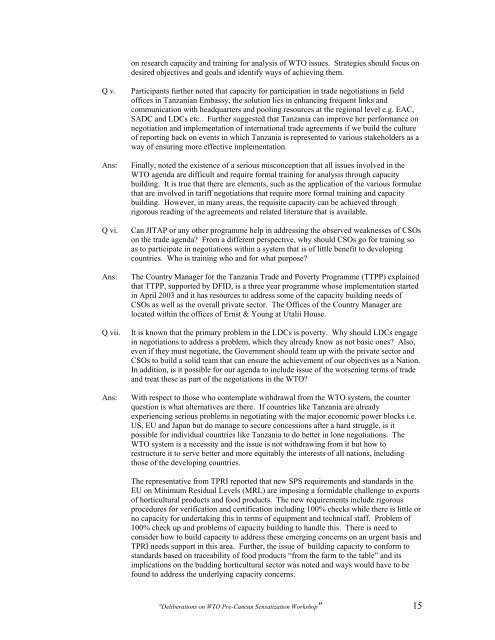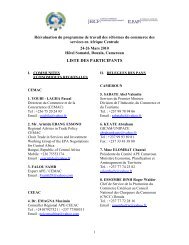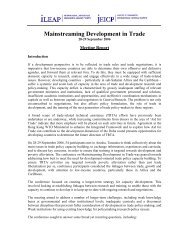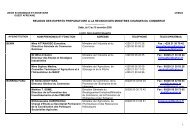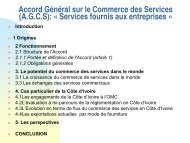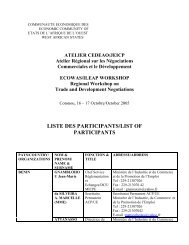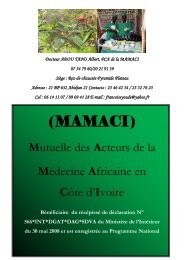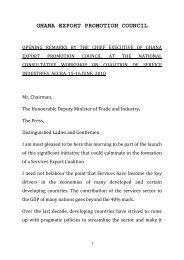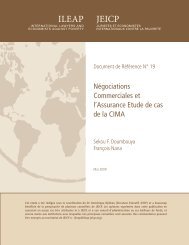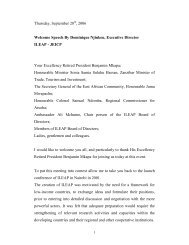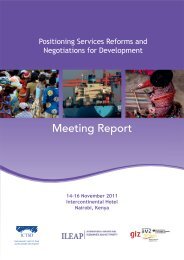Tanzania Report, Dar-Es-Salaam, Tanzania - ILEAP
Tanzania Report, Dar-Es-Salaam, Tanzania - ILEAP
Tanzania Report, Dar-Es-Salaam, Tanzania - ILEAP
Create successful ePaper yourself
Turn your PDF publications into a flip-book with our unique Google optimized e-Paper software.
on research capacity and training for analysis of WTO issues. Strategies should focus ondesired objectives and goals and identify ways of achieving them.Q v.Ans:Q vi.Ans:Q vii.Ans:Participants further noted that capacity for participation in trade negotiations in fieldoffices in <strong>Tanzania</strong>n Embassy, the solution lies in enhancing frequent links andcommunication with headquarters and pooling resources at the regional level e.g. EAC,SADC and LDCs etc.. Further suggested that <strong>Tanzania</strong> can improve her performance onnegotiation and implementation of international trade agreements if we build the cultureof reporting back on events in which <strong>Tanzania</strong> is represented to various stakeholders as away of ensuring more effective implementation.Finally, noted the existence of a serious misconception that all issues involved in theWTO agenda are difficult and require formal training for analysis through capacitybuilding. It is true that there are elements, such as the application of the various formulaethat are involved in tariff negotiations that require more formal training and capacitybuilding. However, in many areas, the requisite capacity can be achieved throughrigorous reading of the agreements and related literature that is available.Can JITAP or any other programme help in addressing the observed weaknesses of CSOson the trade agenda? From a different perspective, why should CSOs go for training soas to participate in negotiations within a system that is of little benefit to developingcountries. Who is training who and for what purpose?The Country Manager for the <strong>Tanzania</strong> Trade and Poverty Programme (TTPP) explainedthat TTPP, supported by DFID, is a three year programme whose implementation startedin April 2003 and it has resources to address some of the capacity building needs ofCSOs as well as the overall private sector. The Offices of the Country Manager arelocated within the offices of Ernst & Young at Utalii House.It is known that the primary problem in the LDCs is poverty. Why should LDCs engagein negotiations to address a problem, which they already know as not basic ones? Also,even if they must negotiate, the Government should team up with the private sector andCSOs to build a solid team that can ensure the achievement of our objectives as a Nation.In addition, is it possible for our agenda to include issue of the worsening terms of tradeand treat these as part of the negotiations in the WTO?With respect to those who contemplate withdrawal from the WTO system, the counterquestion is what alternatives are there. If countries like <strong>Tanzania</strong> are alreadyexperiencing serious problems in negotiating with the major economic power blocks i.e.US, EU and Japan but do manage to secure concessions after a hard struggle, is itpossible for individual countries like <strong>Tanzania</strong> to do better in lone negotiations. TheWTO system is a necessity and the issue is not withdrawing from it but how torestructure it to serve better and more equitably the interests of all nations, includingthose of the developing countries.The representative from TPRI reported that new SPS requirements and standards in theEU on Minimum Residual Levels (MRL) are imposing a formidable challenge to exportsof horticultural products and food products. The new requirements include rigorousprocedures for verification and certification including 100% checks while there is little orno capacity for undertaking this in terms of equipment and technical staff. Problem of100% check up and problems of capacity building to handle this. There is need toconsider how to build capacity to address these emerging concerns on an urgent basis andTPRI needs support in this area. Further, the issue of building capacity to conform tostandards based on traceability of food products “from the farm to the table” and itsimplications on the budding horticultural sector was noted and ways would have to befound to address the underlying capacity concerns."Deliberations on WTO Pre-Cancun Sensatization Workshop" 15


